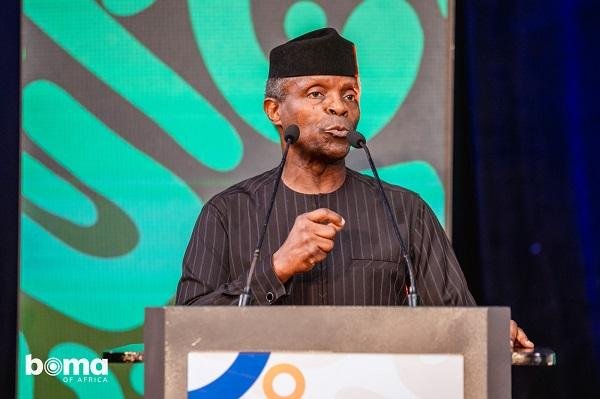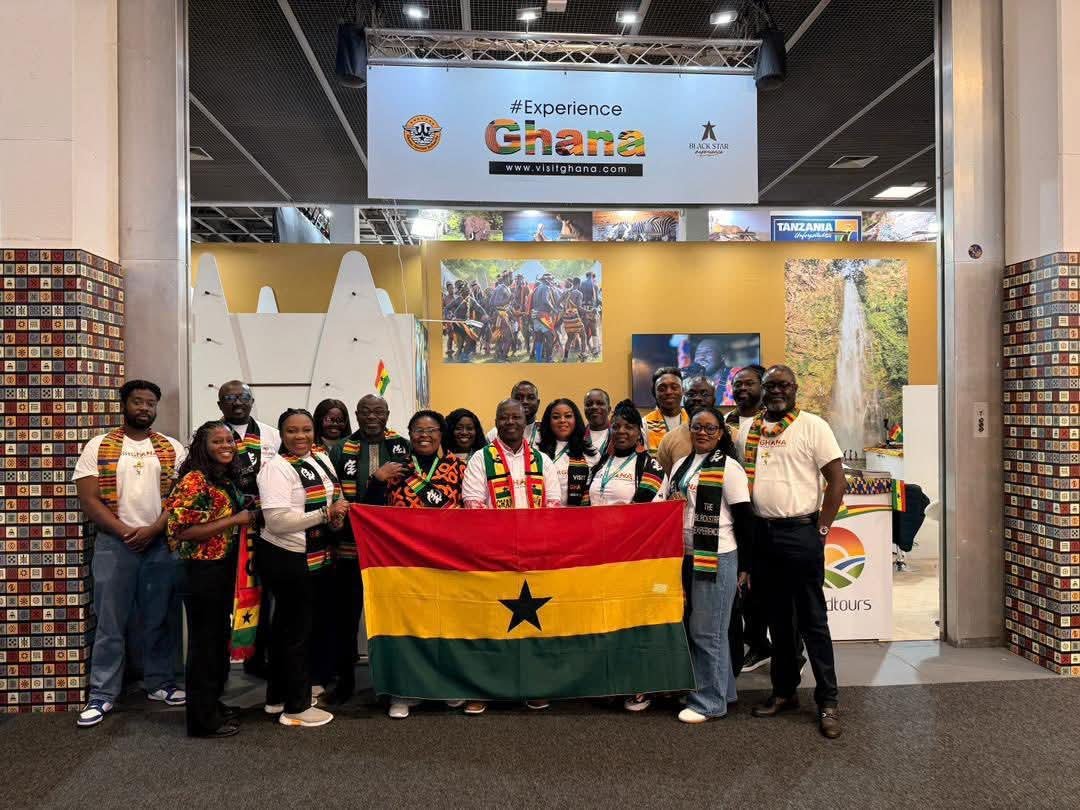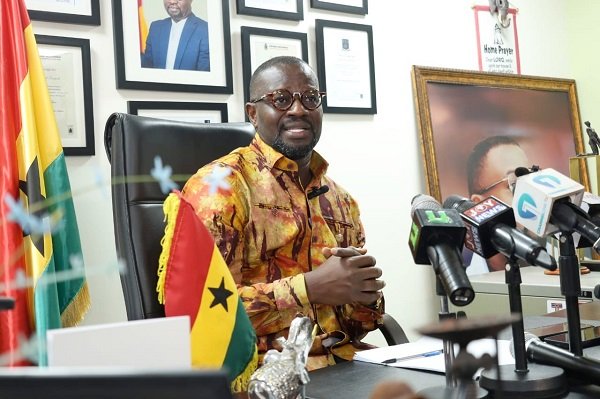Hot!
Collaborate and work together to Improve Intra-African Trade – Osinbanjo to African Countries

Prof. Oluyemi Oluleke Osinbajo, former Vice President of the Federal Republic of Nigeria has urged African countries to collaborate, work together to improve intra-African trade.
He said this could be done by building infrastructure that connect the countries both digitally and physically.
He noted some of Africa’s accomplishments at the level of intra-African trade, stating that as much as 41 per cent of Africa’s machinery exports were traded within the continent.
Prof. Osinbajo also noted that 35 per cent of biopharmaceutical products and 30 per cent of industrial chemicals were already being traded as a measure of intra-African trade.
Speaking at the BOMA of Africa event on the sidelines of the Africa Union’s Mid-Year Coordinating Meeting held in Accra last Saturday, Prof. Osinbajo said it is in the best interest of Africa to improve trade among its member countries.
This year’s theme for BOMA of Africa, “From the Africa We Want to the Africa We Build,” encapsulates the essence of Africa’s journey. Through focused discussions on health, wealth creation, development financing, and governance, BOMA 2024 aimed to ignite new momentum towards realizing Africa’s continental aspirations. By spotlighting major projects and initiatives, the event aimed to foster a spirit of collaboration and determination.
Touching on Africa’s rich biodiversity, Prof. Osinbajo said the continent had high biodiversity reserves and the scale of natural capital to preverse centuries of ecological erosion and the unbridled carbon-laden industrialisation of yesterday.
Noting that there is a wave of brain drain that has hit African countries, Prof. Yemi Osinbajo, who previously served as Attorney General of Lagos State from 1999 to 2007, said Africa must create an environment that rewards the talents of its people to prevent movement of African labour to other continents.
“Labour is always going to find the place where it is best rewarded. Anywhere in the world, wherever labour is best rewarded, that’s where it’ll go. That’s why there are lots of movements all across the world. It’s, therefore, best for Africa to create the environment for rewarding talent,” Prof. Osinbajo said.
He said according to experts, as much as one quarter of the planet’s workforce was likely to be of African origin and of the youthful workforce in particular, as much as 42 per cent may be in Africa by 2050.
“according to him, an energetic pool of youthful talent fortified with fast-advancing artificial intelligence and the geoengineering edge of a world that is desperately in need of a new economic growth paradigm is an edge that the rest of the world ignores at great risk.”
“Integrate trade, digital transaction and work together to build a resilient, rich, prosperous economy and then people will stay and people will come from everywhere in the world to Africa. There’s no other solution,” he said.
With regards to Africa’s health development readiness, Prof. Osinbajo noted that during the pandemic, Africa, through the collaboration of Panavirus and the Africa CDC, brokered by AfroChampions, built and deployed the world’s first vaccine passport.
“The Panavirus platform digitally connected labs and hospital facilities, as well as pathogen genomic centres in 20 countries of Africa,” he added.
AUDA-NEPAD and AfroChampions, alongside other strategic partners, have hosted the annual BOMA of Africa event during African Integration Week since 2019. This year’s BOMA was aligned with the AU Mid-Year Coordination Meeting, further cementing its significance on the continent’s commemorative calendar.
The BOMA of Africa has become a premier platform for showcasing the continent’s most inspirational achievements in unity and integration.
Convened at the highest level, the event aims to move beyond discussions to concrete actions, inspiring Africans across various fields such as science, technology, education, the creative arts, and entrepreneurship.
The 2024 BOMA of Africa is a strategic milestone on the path to achieving the Africa We Want. AUDA-NEPAD and AfroChampions reaffirm their unwavering commitment to the goals of Agenda 2063, setting a precedent for accountability, innovation, and unity across the continent.
Hot!
Ghana Showcases Culture and Investment Potential at ITB Berlin 2026

Ghana Tourism Authority is leading Ghana’s participation at ITB Berlin, which opened in Berlin with a vibrant national pavilion highlighting Ghana’s rich cultural heritage, tourism destinations and investment opportunities.
March 5 has been designated as Ghana Day, a special platform to promote Ghana’s languages, cuisine, Kente, festivals and business prospects to the global tourism community. The stand has already drawn strong interest with traditional arts and crafts displays, immersive multimedia presentations and popular Ghanaian snacks.
Seven private-sector players are exhibiting alongside government officials as part of efforts to deepen trade partnerships, expand market access, and attract investment across the hospitality, heritage tourism, ecotourism, and creative arts sectors.
Ahead of the official opening, the Ghana delegation also engaged young Ghanaian investors in Germany in collaboration with V Afrika-Verein and the Ghana Embassy, strengthening diaspora investment linkages and highlighting opportunities within the tourism value chain.
Ghana’s coordinated presence at ITB Berlin 2026 reinforces its strategy to position the country as the Gateway to Africa and a competitive destination for leisure travel and global investment.
Hot!
Annoh Dompreh raises alarm over DACF arrears, calls for payment of contractors

The Member of Parliament for Nsawam Adoagyiri, Frank Annoh Dompreh, has expressed concern over delays in the release of the District Assemblies Common Fund, warning that the situation is stalling development across the country.
On his facebook page, he described as a matter of urgent national importance, the Minority Chief Whip pointed to what he sees as a growing crisis of unpaid contractors, abandoned projects, and halted infrastructure works in many districts.
He noted that several communities are grappling with half completed schools, unfinished health facilities, abandoned markets, deteriorating roads, and stalled sanitation projects.
According to him, many contractors who have executed projects for district assemblies have not been paid, forcing some construction firms to demobilise from sites while workers lose their jobs.
He stressed that the District Assemblies Common Fund is not a discretionary allocation but a constitutional requirement under Article 252 of the 1992 Constitution, intended to support development at the local level.
In his view, years of delayed releases and accumulated arrears have weakened district development financing and disrupted projects meant to improve living conditions in communities.
He further argued that some payments made in recent years were largely the settlement of old debts rather than funding for new or ongoing projects, a situation he believes has affected contractor confidence and local economic activity.
He described the issue as more than a budgetary challenge, characterising it as a development emergency and a governance concern.
He therefore urged the appropriate authorities to pay outstanding DACF arrears, settle contractors who have completed their work, and ensure that transfers to districts are automatic and predictable.
He maintained that decentralisation can only succeed when district assemblies receive adequate and timely funding to carry out development projects.
He emphasised that stalled projects directly affect ordinary citizens, since they rely on such infrastructure for education, healthcare, transportation, sanitation, and economic activities.
He called for renewed attention to grassroots development, insisting that national progress should not be concentrated only in major cities but extended to all communities.
By: Jacob Aggrey






